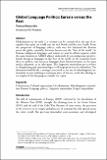Files in this item
Global language politics : Eurasia versus the Rest
Item metadata
| dc.contributor.author | Kamusella, Tomasz | |
| dc.date.accessioned | 2021-01-25T12:30:11Z | |
| dc.date.available | 2021-01-25T12:30:11Z | |
| dc.date.issued | 2020-12-31 | |
| dc.identifier | 272472061 | |
| dc.identifier | c5c6fdef-cb18-4d69-bfd4-7bf9e82a37b9 | |
| dc.identifier | 85099056682 | |
| dc.identifier.citation | Kamusella , T 2020 , ' Global language politics : Eurasia versus the Rest ' , Journal of Nationalism, Memory and Language Politics , vol. 14 , no. 2 , pp. 117-151 . https://doi.org/10.2478/jnmlp-2020-0008 | en |
| dc.identifier.issn | 2570-5857 | |
| dc.identifier.other | Jisc: a4952d1ba1c249efa0f505399f0577c1 | |
| dc.identifier.other | ORCID: /0000-0003-3484-8352/work/87404597 | |
| dc.identifier.uri | https://hdl.handle.net/10023/21315 | |
| dc.description.abstract | Globalization in the early 21st century can be considered as the age of inequality that splits the world into the rich North and the poor South. From the perspective of language politics, only very few discussed the division across the globe, especially, between Eurasia and the “Rest of the world.” In Eurasia, indigenous languages and scripts are used in official capacity, while the same function is fulfilled almost exclusively by non-indigenous (post/colonial) European languages in the Rest of the world. In the countries where they are spoken, non-Eurasian languages have limited presence in the mass media, education, or in cyberspace. This linguistic imperialism par excellence is a long-lasting and pernicious legacy of European (western) colonialism. The aforementioned divide is strongly associated to the use of ethnolinguistic nationalism in state building across many areas of Eurasia, while this ideology is not employed for this purpose outside the region. | |
| dc.format.extent | 35 | |
| dc.format.extent | 383367 | |
| dc.language.iso | eng | |
| dc.relation.ispartof | Journal of Nationalism, Memory and Language Politics | en |
| dc.subject | Colonization | en |
| dc.subject | Cultural imperialism | en |
| dc.subject | Decolonization | en |
| dc.subject | Ethnolinguistic nationalism | en |
| dc.subject | Language politics | en |
| dc.subject | Language imperialism | en |
| dc.subject | Scriptal imperialism | en |
| dc.subject | J Political Science | en |
| dc.subject | P Language and Literature | en |
| dc.subject | T-NDAS | en |
| dc.subject.lcc | J | en |
| dc.subject.lcc | P | en |
| dc.title | Global language politics : Eurasia versus the Rest | en |
| dc.type | Journal article | en |
| dc.contributor.institution | University of St Andrews. School of History | en |
| dc.contributor.institution | University of St Andrews. St Andrews Institute for Transnational & Spatial History | en |
| dc.identifier.doi | 10.2478/jnmlp-2020-0008 | |
| dc.description.status | Peer reviewed | en |
This item appears in the following Collection(s)
Items in the St Andrews Research Repository are protected by copyright, with all rights reserved, unless otherwise indicated.

